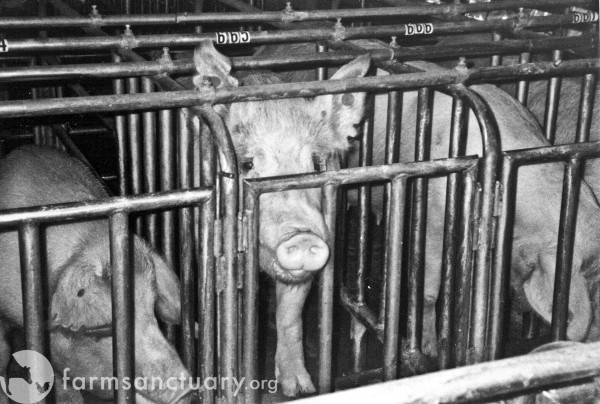
Imagine not being able to turn around or even move for an entire lifetime.
That’s why the Humane Society of America teamed up with the SUNY New Paltz Environmental Task Force to raise awareness on factory farming.
Advocacy groups spoke about the dangers of factory farming in the Lecture Center at the New Paltz campus on Sept. 30.
Factory farming, or intensive animal farming, is a system of keeping livestock using intensive methods, where farm animals are confined indoors under strictly controlled conditions. This practice is seen as inhumane by advocates who cite high densities of animals in often confined spaces.
There are currently no federal laws protecting farm animals, according to Matt Dominguez, the Public Policy Manager of Farm Animal Protection at The Humane Society of the United States (HSUS). He said to the large New Paltz crowd that every state has an anti-cruelty law for animals like pets but not farm animals.
Dominguez showed the audience examples of HSUS efforts to stop abuse against these factory farm animals. He said in their investigations they found factory farms that grounded up baby piglets that had died and were fed back to their mothers.
“These are factories, these aren’t farms,” he said. “[The companies] don’t want you to see anything.”
Utah, Missouri and Iowa are three states that have anti-whistleblowing laws that prevent investigative efforts by organizations like the HSUS, Dominguez said.
But these efforts are often muted due to increased public meat demand.
Brian Shapiro, the New York Director for the HSUS said cutting meat out of diets or even reducing meat intake makes a difference.
“We don’t even think,” Shapiro said. “Before World War II, we did not have this obsession with a meat-based diet. We can all make choices on what we buy.”
Shapiro said it doesn’t matter if you’re vegan or do eat meat, if everyone did just a meatless Monday, it would make a big difference.
It may cut back on the 10 million animals slaughtered every year.
The campus event drew in a large crowd, with representatives present from the New York Public Interest Research Group, the Zine Club, recycling club, Woodstock Farm Animal Sanctuary, Students For Sustainable Agriculture and Hudson Valley For No GMOs.
Barbara Upton, co-founder of Hudson Valley for No GMOs said genetically modified foods make factory farming factors even more dangerous.
According to Upton, 95 percent of the feed that factory farm animals eat are genetically modified, a controversial mutation of many crops that has demonstrated growing evidence of harm.
Upton said the issue of factory farming and GMOs go hand in hand with climate change and other environmental issues.
“They’re two sides of the same coin,” she said. “Both are disastrous for human health and the environment. GMO ‘super weeds’ and bugs have developed resistance and we’re just drenching our countryside in more and more poison.”
Switching to organic farming practices nationally could sequester 100 percent of current carbon emissions, according to Upton citing a Rodale Institute study, a nonprofit organization on organic farming.
On top of the human health dangers, there are environmental considerations to factory farming, according to SUNY New Paltz alumn, Elizabeth Moran, the water and natural resources associate for the Environmental Advocates of New York.
There are over 37,000 factory farms nationally, according to Moran. A medium sized farm has 300-699 cattle. A large one has over 700 cattle.
These cows excrete 120 pounds of waste per cow, per day, further affecting the environment.
Professor Michael Boms from the Biology Department spoke about the dangers of overuse of antibiotics in factory farms.
He warned that the antibiotics that keep factory farm animals from getting sick are then ingested by meat-eaters. Boms said in the future certain antibiotics simply won’t work anymore and that even strep throat could become deadly for children.
There will be a march in New Paltz protesting the use of GMOs at Peace Park on Oct. 12 at 2 p.m.
